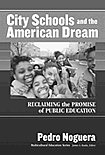 By Pedro Noguera (Teachers College Press, 224 pages, $19.95)
By Pedro Noguera (Teachers College Press, 224 pages, $19.95)
BUY NOW!
Educators who seek to make a difference in the lives of students face tremendous challenges working in urban public schools that are under-resourced and over-burdened. In response, Pedro Noguera maps out his vision of hope and pragmatism in City Schools and the American Dream. Building on his experience as a former teacher, school board member, parent, activist, researcher, and Executive Assistant to a former mayor of Berkeley, CA, Noguera’s City Schools provides a grounded analysis of how social forces undermine the quality of urban schools and the achievement of students of color. Noguera asserts that to meet the promise and end the perpetual crisis of public city schools, we must directly address the social context of urban education. However, unlike many others who have written on urban school reform, Noguera’s call for schools to create partnerships that help provide social services and address urban conditions is only the surface of his argument.
On balance, City Schools is committed to showing how poverty, low social status, racial stereotypes, and other inequities not only affect children’s needs and the resources available in their communities, but also translate into low political and social clout. Noguera illustrates how this means some parents have the ability to control the quality of their children’s education and some don’t. Whether due to stereotypes about which families care about education, to the ability to choose a private school when you are dissatisfied with your public school, to the privilege to hire a lawyer in a dispute regarding your child, or to the power to press the district to keep your school from getting shut down — more affluent families use what Noguera refers to as “social capital” to have greater control over their local schools. Noguera asserts the need to find ways to ensure that all families are able to hold schools accountable for responsive, quality, teaching. According to City Schools, addressing the social context involves remaking relationships of accountability to empower currently marginalized families and communities.
Through his analysis of the Bay Area, Noguera illustrates how cities and districts don’t possess social power and wealth evenly. He views this is a central obstacle to reform and argues that all acts of reform, however big or small, “must be based on a willingness to engage in a process of change that aims at transforming relationships between those who have power and those who do not. Unless this transformation occurs, it is unlikely that even ambitious reforms will lead to lasting change.” This analysis is one of the critical contributions City Schools makes to the dialogue on school reform.
Some might call Noguera’s overall agenda a radical one. But he goes to great pains to define himself as a “pragmatic optimist.” And City Schools forwards an argument clearly directed at progressives within the educational arena: our commitment to address the social context of schooling must be practical, not ideological, geared toward whatever ultimately will work for children. In his perspective “we must figure out how to work within the limits of what is possible at this historical moment…the challenge is to figure out how to be heard and taken seriously within debates over policy, rather than being content with the irrelevance that comes from being comfortably planted on the margins with other critics.”
City Schools is an important read for those who want to expand on the successes of some urban CES schools. How do CES educators find ways to keep to what is “essential” – the central task of teaching and learning – while addressing what Noguera articulates is fundamental – the environment and social and political context of a community the affects how students learn and whether schools are consistently and appropriately responsive. To close the racial achievement gaps that persist even in CES schools, though they may be smaller than in comprehensive urban schools, it is imperative that we continue to ask ourselves how a community’s race, class, and social context affects the implementation of personalization, democracy and equity.
City Schools might be dissatisfying to someone looking for specific answers and remedies. As Noguera himself states, the book is an “exploration” to “uncover lessons” on how some urban schools tried to deal with constraints. The power of City Schools lies in Noguera’s humane, respectful, and impassioned perspective. We must meet the needs of communities and improve the conditions that impair the ability of schools to educate. But we also must respect the place public schools have in communities and find ways to make them accountable to the families that send their children there.
Most of those who have the calling to work in urban schools need to understand the context of their students’ realities. They also need to have their passion and drive nurtured and rekindled. This book feeds the urban educator’s need for insight and purpose. It will not leave practitioners with detailed strategies for use in their classrooms, or with a tried and proven list of reforms for administrators, it but will leave them more hopeful, better informed and better equipped for their daily mission.
Lisette Lopez is a member of the CES National mentor and new schools project team. For the last six years she has integrated action research, policy advocacy, and capacity building to help schools, youth programs and neighborhood agencies respond positively and equitably to diverse students
